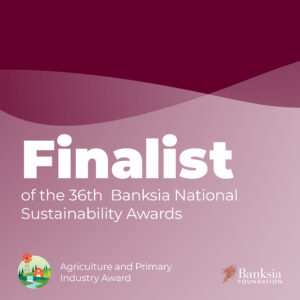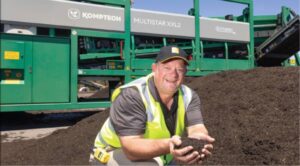Dr Mike Peterkin at the C-Wise soil health seminar at Voyager Estate


Neville Passmore interviews Dr Mike Peterkin of Pierro Wines
Mike Peterkin is a real innovator in the wine industry, bringing new blends to the market that are now standards around the country. We caught up at the C-Wise Soil Health Seminar held at Voyager Estate in September, and asked what was he currently working on.
Mike’s latest project is a concept called ‘Garden Farming’.
“We’ve been using compost for a few years now. I spoke to Dave Cullen of C-Wise about ten years ago and we were interested in getting into it then but because of our high density plantings and very narrow rows there wasn’t a spreader that could apply the compost. So a couple of years ago we had one custom built for our use and for the past three years we’ve been able to get into compost. Like a lot of people we want to have our vineyards as sustainable and wholesome as possible. We are bringing in a concept called garden farming where we introduce sheep into the vineyards, people are already doing that in the district.”
Apparently this is to keep the grass down. “Essentially, the problem with sheep is they will eat the grape leaves so you have got to have them out before bud burst. Then, hopefully, the grass wont grow up too high after they have been out. It’s a concept of intense grazing; so you put a high number of sheep in for a short period of time and they mow the grass right down and stimulate the growth of clover and things like that. And the manure goes back also. One of the disadvantages of that however is often when the sheep have mown it down the vineyard looks bare. The garden part of the farming is that were going to plant native species every 25 metres or so. Varieties will be chosen that flower at that time of the year from early spring into summer. The idea of that is to keep all the beneficial insects in the vineyards.”
I asked if he was aiming, with the native plantings, to bring birds in as well to do a particular job.
“We specifically don’t want birds if we can avoid them because we have found in the past when planting windbreaks that these brought in the birds and these of course eat the grapes. So what were trying to do is balance the two things and have a situation where we have got plenty of insects, bees; that sort of thing, without the birds”.


Yellow flowering hibbertia and purple pea hovea are examples of local area native plants that are not bird attracting and these both put on their flower show at the right time of the year
I wondered if there was anything new being used to keep powdery mildew under control other than sulphur. “It is interesting, sulphur has been the standard and its still very good the disadvantage is its negative effect on beneficial mites for instance. Some of the newer synthetic products are much kinder to these beneficials insects and mites. However the general trend is that we are moving back to sulphur because were trying to limit the number of different chemicals that are applied in a vineyard. So like most things in life its a balancing act.”
“A lot of people like us are moving to more organic systems simply because we think its a better way to go but we don’t want to be certified as organic. I see that as a closed system to some extent which doesn’t give you room for innovation because of the certification process which I think is too narrow.”
I asked if it might be time to think through a new form of certification which gives vineyards more room to move.
“Yes more flexibility is needed – if you look at any system to work in the long run you have to be able to innovate and the problem I have with the current certified organic system is that its a closed system, theres no room for that. In some areas it will work just fine but in others it wont necessarily.
I think what consumers tell us is that they use the term organic to tell us producers we want what your providing for us to be healthy and hopefully good for our health. They don’t understand the the organic certification system at all. They’re using that term and I think if we can provide something thats good for their health and is produced in a sustainable manner we then satisfy their needs.





